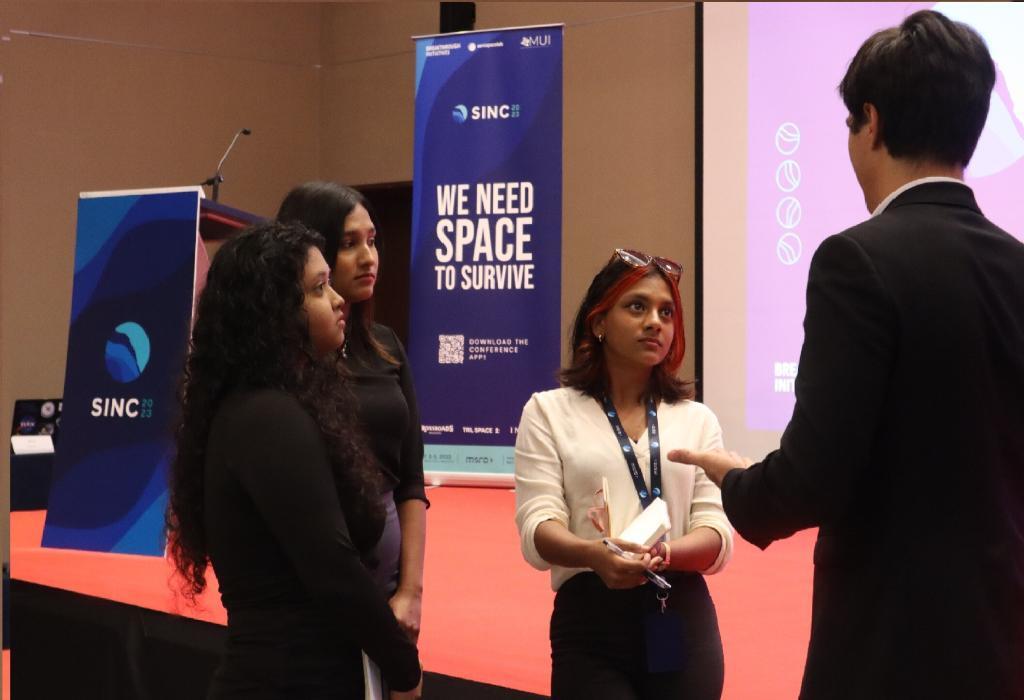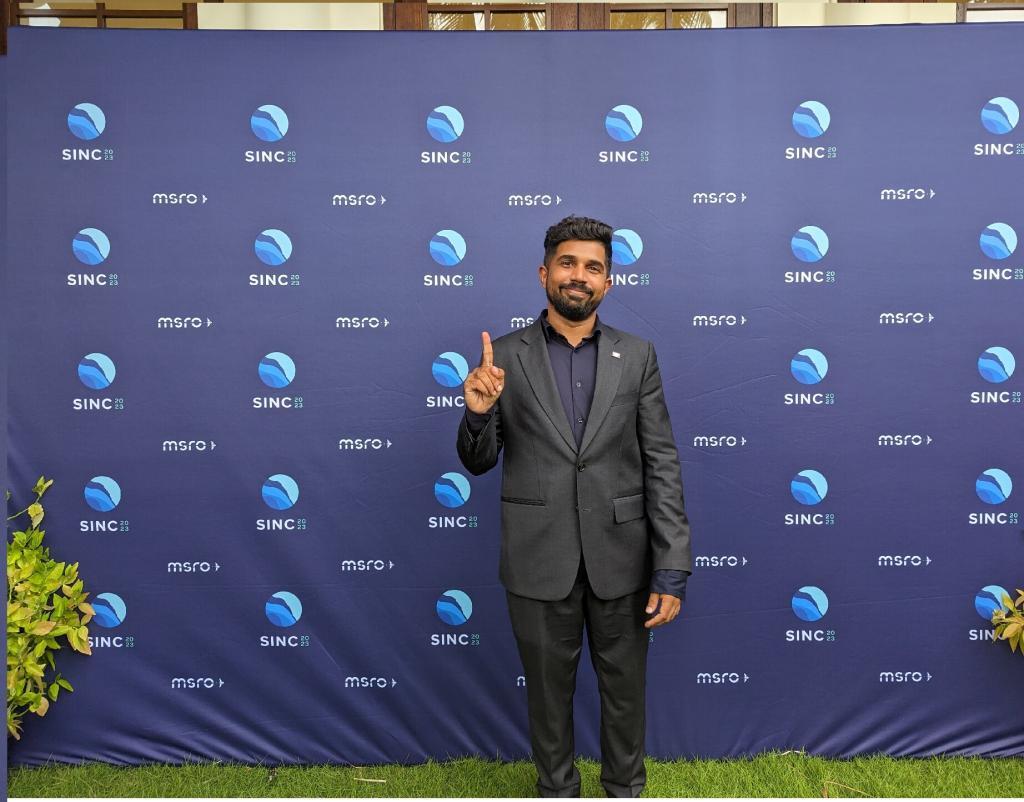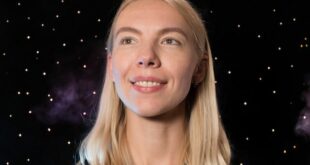By Tom Gardner

Amidst climate crisis, one small island nation is rethinking the value of space for climate adaptation.
The Maldives hosted its first ever space conference last month. The Space for Island Nations Conference 2023, or ‘SINC’ for short. Of course the name ‘SINC’ was chosen with a wink. Small island nations are in trouble. As the flattest country on Earth (an average of 1.2 metres above sea level and only 0.4% of land area), the threat posed to the Maldives by climate change has been known for decades.
For a country comprised of 1,192 small coral islands, space comes at a premium. Every aspect of land use is compressed to meet the concentrations that come with planning for islands varying from 7.3 km² to the size of a running track. Policymaking has always been a major administrative challenge in the Maldives; throw in a climate crisis and what would otherwise be a bureaucratic jigsaw is increasingly taking a more existential dimension.
Climate resilience considerations are vital, but something else very clearly emerged from SINC. Yes, space cannot be the solution; it is a toolkit to be packaged in a powerful myriad of different ways. However, as small island nations like the Maldives confront the psychological shock that their home is at risk of being uninhabitable by mid-century thanks to a brutal combination of sea-level rise and wave-driven flooding, the value of space goes beyond the toolkit.
Space as a Toolkit
The Maldives will soon take on water. It hasn’t yet because those blue-flecked faros you see from the airplane window have thrown it a lifeline. Specifically, coral atolls—essentially, islands based on coral reefs rather than rock or sand—can naturally adapt to sea level and seasonal wave changes by topping themselves up with depleted coral skeletons, in this way undercutting the power of the ocean as swells approach.
The breaking of waves on reefs offshore forms a reassuring soundscape of safety from the sea. I was unsurprised to learn the word ‘atoll’ comes from the native Dhivehi atholhu, meaning a ‘chain of islands”. Charles Darwin recognized its indigenous origin and coined the definition of atolls as any “circular groups of coral islets” that is synonymous with “lagoon-island”. Maldives, the ‘Coral Nation’, really does owe its continued existence to its namesake. However, climate change is systematically exposing this delicate ecosystem to irreversible tipping points by degrading coral flats through ocean warming and acidification. Live coral used to cover about half of the reefs in the Maldives. After three catastrophic die-offs occurred in 1998, 2016, and 2020, live coral cover is at less than 20%.
The fight against climate change needs an arsenal of capabilities and space technologies can be remarkable assets—real-time comms, high-fidelity monitoring, illegal fishing and waste dumping detection. The Maldives Space Research Organisation (MSRO)—the NGO behind SINC—is developing a range of capabilities from across the space toolkit. Last February, in consortium with experts from seven countries, MSRO leveraged a mixture of satellite and drone-based remote sensing complemented by on-site data collection to diagnose ecosystem health in Baa Atoll and to better manage climate and environmental challenges. The young organisation has teamed up with the National Disaster Management Authority to develop a multi-layered data dashboard to improve maritime and environmental security, and is engaged in actionable research about localised coastal erosion, wave-induced flooding, and tidal fluctuations important for island councils taking critical land use decisions.
Space can be a tremendous toolkit, but it holds profound value beyond the technical.
After eleven months of work behind the scenes, SINC was a moment of catharsis for MSRO. The organisation finally had the right platform to announce its work and mission to the public. Spread across three full days of programming, SINC spoke to a thematic story of optimism in the face of serious challenges. Over one hundred people from over fifteen countries descended on the stunning venue at Crossroads Maldives to discuss how space could help the country. A partnership between MSRO and UNICEF empowered over forty youth delegates from across disciplines and atolls to participate and mingle with space experts from every silo over fresh coffee and octopus rolls.
Like GLOC (Global Space Conference on Climate Change) in Oslo last week, SINC painted the tangible potential of the space for climate action toolkit. It fulfilled its purpose in sparking innovative thinking amongst both incoming and established professionals on new ways to approach problem-solving amidst the unique constraints and challenges of small island nations. For example, one session explored the role of resorts as a space-tech-savvy changemaker that could help build climate resilience outside financial and political institutional constraints; elsewhere the potential of island councils in decentralising in-situ data collection to support remote sensing observations was discussed.
However, as we discuss space and climate crisis, the glue between the two can be more than a question of the right spectral and signals tracking above, or the best payload and policy down below.
Rethinking the value of space: Beyond the tech-fix
Space can be a tremendous toolkit, but it holds profound value beyond the technical. Opening GLOC 2023, the Norwegian Minister of Climate and the Environment Espen Barth Eide, alluded to the importance of space’s impact in terms of “psychological knowledge”, the role of the Earthrise picture in galvanising a global sense of galactic smallness and exposure. As Maldivians grapple with a similar sense of vulnerability on Earth, looking to space for climate adaptation feels as necessary for the practical applications as it does for a psychology of hope.
As Maldivians come to terms with the death of coral, the loss of fisheries, cascading flood risk, and political disillusionment at the prospect of another precarious election this September, they can benefit from more than just the clever space tech tools and trinkets with which to tinker and tweak to get by. A cost-benefit reflex can overcompensate and breed industrial efficiency in our understanding of value, the ROIs or boons to GDP. However, this is all the same sanitised gaze which discounts the power of a photograph, a dolphin’s leap, or a star’s twinkle in the sky.
Climate crisis can be as much a physical as a psychological burden
Reflecting on SINC, it was not the session on space for ‘spatial planning and food security’ or ‘biodiversity monitoring in an era of mass extinction’ that made the young people in the room sit up. The utter silence when Dr Pete Worden, Executive Director of Breakthrough Initiatives, spoke about exoplanets that could look like the Maldives, the spontaneous applause after Dr Harold White’s presentation on interstellar travel ended with the Limitless Institute’s film ‘Go Incredibly Fast’, the fixed attention when Petr Bohacek described the recently-funded Lunar Geology Orbiter Mission (LUGO) under an international consortium of emerging space players – this was when SINC sparkled.
These moments are the reasons MSRO is seeking to rejuvenate the practise of astronomy in the Maldives, to build on existing astrotourism initiatives and recognise the importance of Dark Skies. The organisation is bringing the first student-led radio telescope programme to the Maldives thanks to a partnership with Breakthrough Watch and Breakthrough Listen and is exploring ways for Maldivian youth to have the opportunity to pursue space science and education courses unavailable nationally. The power of space to inspire cannot be underestimated, and it should come as no surprise that MSRO’s slogan is “Maldivians have always looked to the stars”.
During SINC’s opening ceremony, Madin Maseeh, Founder and President of MSRO took to the stage: “For the past few decades, the identity of us Maldivians has revolved around the sunny side of life—it has revolved around how we must protect what we have.” He continued “Our identity currently is one of despair around losing this precious thing that we value, the sunny side of life, the beautiful beaches, the islands all of you are enjoying. However, that is not who we are as people, that is what we have.”

Young Maldivians comprise nearly 40% of the country’s population; they seek definition beyond the commercialised constructs of traditional tourism, a sense of self that reclaims a faded indigeneity worlds apart from a bambooed beach brochure reserved for Russian billionaires and Chinese creditors alike.
“In order to carve a future, we look and build with hope, we need a new identity, an identity rooted in who we truly are,” Madin argued. “Our forefathers used the stars to navigate these waters. We must look to them again to navigate this dark future that we find ourselves in.”
Climate crisis can be as much a physical as a psychological burden; especially in the most vulnerable places in the world, the value of space for climate adaptation goes beyond the toolkit. As the hour grows late and the clouds draw near, the Maldives is rethinking what is relevant for the space-climate hyphen.

Tom Gardner is currently the heading up strategic partnerships at the Maldives Space Research Organisation (MSRO), the first entity in the Maldives dedicated to the research and development of the space sector. He holds a masters degree in History and is currently pursuing a second masters at the University of Oslo exploring development and sustainability issues in contemporary Asia. Tom was part of the Steering Committee for the first Space for Island Nations Conference 2023 and is a new member of the recently formed Association of Space Entrepreneurs in the Indo-Pacific (ASEIP). He received a full scholarship from the European Space Agency to participate in the International Space University’s Space Studies Program 2022 and has a background in ESG consultancy and online media.





